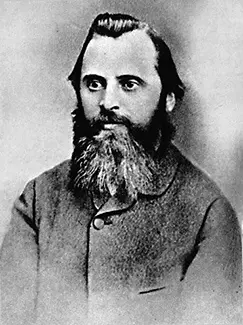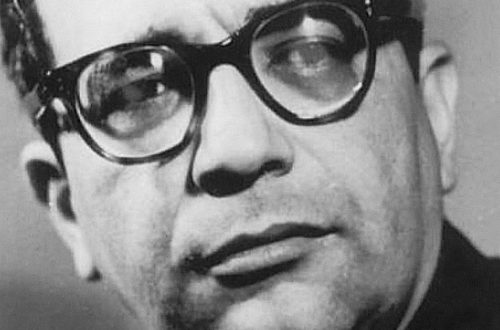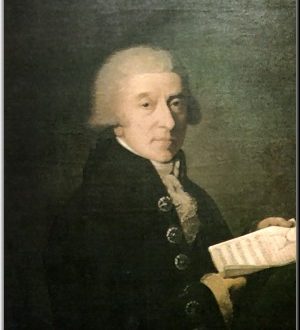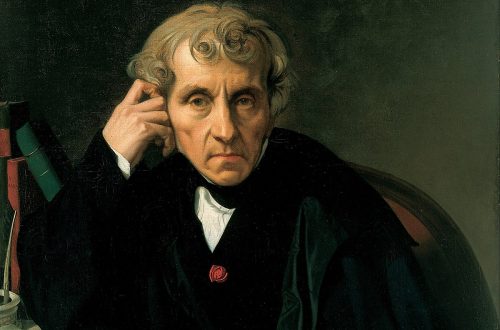
Mily Balakirev (Mily Balakirev) |
Mily Balakirev
Any new discovery was for him true happiness, delight, and he carried away with him, in a fiery impulse, all his comrades. V. Stasov
M. Balakirev had an exceptional role: to open a new era in Russian music and lead a whole direction in it. At first, nothing foretold him such a fate. Childhood and youth passed away from the capital. Balakirev began to study music under the guidance of his mother, who, convinced of the outstanding abilities of her son, specially went with him from Nizhny Novgorod to Moscow. Here, a ten-year-old boy took several lessons from the then-famous teacher, pianist and composer A. Dubuc. Then again Nizhny, the early death of his mother, teaching at the Alexander Institute at the expense of the local nobility (his father, a petty official, having married a second time, was in poverty with a large family) …
Of decisive importance for Balakirev was his acquaintance with A. Ulybyshev, a diplomat, as well as a great connoisseur of music, the author of a three-volume biography of W. A. Mozart. His house, where an interesting society gathered, concerts were held, became for Balakirev a real school of artistic development. Here he conducts an amateur orchestra, in the program of performances of which are various works, among them Beethoven’s symphonies, acts as a pianist, he has at his service a rich music library, in which he spends a lot of time studying scores. Maturity comes to a young musician early. Enrolling in 1853 at the Faculty of Mathematics of Kazan University, Balakirev leaves it a year later to devote himself exclusively to music. By this time, the first creative experiments belong: piano compositions, romances. Seeing the outstanding successes of Balakirev, Ulybyshev takes him to St. Petersburg and introduces him to M. Glinka. Communication with the author of “Ivan Susanin” and “Ruslan and Lyudmila” was short-lived (Glinka soon went abroad), but meaningful: approving Balakirev’s undertakings, the great composer gives advice on creative pursuits, talks about music.
In St. Petersburg, Balakirev quickly gains fame as a performer, continues to compose. Brightly gifted, insatiable in knowledge, tireless in work, he was eager for new achievements. Therefore, it is natural that when life brought him together with C. Cui, M. Mussorgsky, and later with N. Rimsky-Korsakov and A. Borodin, Balakirev united and led this small musical group, which went down in the history of music under the name “Mighty Handful “(given to him by B. Stasov) and the” Balakirev circle “.
Every week, fellow musicians and Stasov gathered at Balakirev’s. They talked, read aloud a lot together, but devoted most of their time to music. None of the beginning composers received a special education: Cui was a military engineer, Mussorgsky a retired officer, Rimsky-Korsakov a sailor, Borodin a chemist. “Under the leadership of Balakirev, our self-education began,” Cui later recalled. “We have replayed in four hands everything that was written before us. Everything was subjected to severe criticism, and Balakirev analyzed the technical and creative aspects of the works. Tasks were given immediately responsible: to start directly with a symphony (Borodin and Rimsky-Korsakov), Cui wrote operas (“Prisoner of the Caucasus”, “Ratcliffe”). All compositions were performed at the meetings of the circle. Balakirev corrected and gave instructions: “… a critic, namely a technical critic, he was amazing,” wrote Rimsky-Korsakov.
By this time, Balakirev himself had written 20 romances, including such masterpieces as “Come to me”, “Selim’s Song” (both – 1858), “Goldfish Song” (1860). All romances were published and highly appreciated by A. Serov: “… Fresh healthy flowers on the basis of Russian music.” Balakirev’s symphonic works were performed at the concerts: Overture on the themes of three Russian songs, Overture from music to Shakespeare’s tragedy King Lear. He also wrote many piano pieces and worked on a symphony.
Balakirev’s musical and social activities are connected with the Free Music School, which he organized together with the wonderful choirmaster and composer G. Lomakin. Here, everyone could join the music, performing in the choral concerts of the school. There were also singing, musical literacy and solfeggio classes. The choir was conducted by Lomakin, and the guest orchestra was conducted by Balakirev, who included compositions by his circle comrades in the concert programs. The composer always acted as a faithful follower of Glinka, and one of the precepts of the first classic of Russian music was the reliance on the folk song as a source of creativity. In 1866, the Collection of Russian Folk Songs compiled by Balakirev came out of print, and he spent several years working on it. A stay in the Caucasus (1862 and 1863) made it possible to get acquainted with oriental musical folklore, and thanks to a trip to Prague (1867), where Balakirev was to conduct Glinka’s operas, he also learned Czech folk songs. All these impressions were reflected in his work: a symphonic picture on the themes of three Russian songs “1000 years” (1864; in the 2nd edition – “Rus”, 1887), “Czech Overture” (1867), oriental fantasy for piano “Islamey “(1869), a symphonic poem “Tamara”, begun in 1866 and completed many years later.
Balakirev’s creative, performing, musical and social activities make him one of the most respected musicians, and A. Dargomyzhsky, who became chairman of the RMS, manages to invite Balakirev to the post of conductor (seasons 1867/68 and 1868/69). Now the music of the composers of the “Mighty Handful” sounded in the concerts of the Society, the premiere of Borodin’s First Symphony was a success.
It seemed that Balakirev’s life was on the rise, that ahead was an ascent to new heights. And suddenly everything changed dramatically: Balakirev was removed from conducting RMO concerts. The injustice of what happened was obvious. Indignation was expressed by Tchaikovsky and Stasov, who spoke in the press. Balakirev switches all his energy to the Free Music School, trying to oppose its concerts to the Musical Society. But competition with a wealthy, highly patronized institution proved overwhelming. One after another, Balakirev is haunted by failures, his material insecurity turns into extreme need, and this, if necessary, to support his younger sisters after the death of his father. There are no opportunities for creativity. Driven to despair, the composer even has thoughts of suicide. There is no one to support him: his comrades in the circle moved away, each busy with his own plans. Balakirev’s decision to break forever with the art of music was like a bolt from the blue for them. Not listening to their appeals and persuasion, he enters the Shop Office of the Warsaw Railway. The fateful event that divided the composer’s life into two strikingly dissimilar periods occurred in June 1872 ….
Although Balakirev did not serve long in the office, his return to music was long and internally difficult. He earns a living by piano lessons, but he does not compose himself, he lives in isolation and solitude. Only in the late 70s. he starts showing up with friends. But this was a different person. The passion and exuberant energy of a man who shared – albeit not always consistently – the progressive ideas of the 60s, were replaced by sanctimonious, pious and apolitical, one-sided judgments. Healing after the experienced crisis did not come. Balakirev again becomes at the head of the music school he left, works on the completion of Tamara (based on the poem of the same name by Lermontov), which was first performed under the direction of the author in the spring of 1883. New, mainly piano pieces, new editions appear (Overture on the theme of the Spanish march, symphonic poem “Rus”). In the mid 90s. 10 romances are created. Balakirev composes extremely slowly. Yes, started in the 60s. The First Symphony was completed only after more than 30 years (1897), in the Second Piano Concerto conceived at the same time, the composer wrote only 2 movements (completed by S. Lyapunov), work on the Second Symphony stretched for 8 years (1900-08). In 1903-04. a series of beautiful romances appears. Despite the tragedy he experienced, the distance from his former friends, Balakirev’s role in musical life is significant. In 1883-94. he was the manager of the Court Chapel and, in collaboration with Rimsky-Korsakov, unrecognizably changed the musical education there, putting it on a professional basis. The most gifted students of the chapel formed a musical circle around their leader. Balakirev was also the center of the so-called Weimar Circle, which met with Academician A. Pypik in 1876-1904; here he performed with whole concert programs. Balakirev’s correspondence with foreign musical figures is extensive and meaningful: with the French composer and folklorist L. Bourgault-Ducudray and the critic M. Calvocoressi, with the Czech musical and public figure B. Kalensky.
Balakirev’s symphonic music is gaining more and more fame. It sounds not only in the capital, but also in the provincial cities of Russia, it is successfully performed abroad – in Brussels, Paris, Copenhagen, Munich, Heidelberg, Berlin. His piano sonata is played by the Spaniard R. Vines, “Islamea” is performed by the famous I. Hoffman. The popularity of Balakirev’s music, his foreign recognition as the head of Russian music, as it were, compensate for the tragic detachment from the mainstream in his homeland.
Balakirev’s creative heritage is small, but it is rich in artistic discoveries that fertilized Russian music in the second half of the XNUMXth century. Tamara is one of the top works of national genre symphonism and a unique lyrical poem. In Balakirev’s romances, there are a lot of techniques and textural findings that gave rise to outside chamber vocal music – in Rimsky-Korsakov’s instrumental sound writing, in Borodin’s opera lyrics.
The collection of Russian folk songs not only opened a new stage in musical folkloristics, but also enriched Russian opera and symphonic music with many beautiful themes. Balakirev was an excellent music editor: all the early compositions of Mussorgsky, Borodin and Rimsky-Korsakov passed through his hands. He prepared for publication the scores of both operas by Glinka (together with Rimsky-Korsakov), and compositions by F. Chopin. Balakirev lived a great life, in which there were both brilliant creative ups and tragic defeats, but on the whole it was the life of a true innovative artist.
E. Gordeeva





